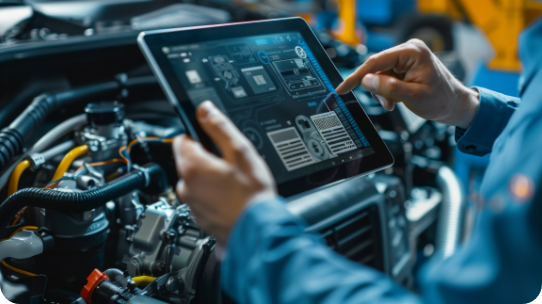- Top
- Featured Jobs
- What does a production technology engineer do?
Table of Contents
What is a Production Engineering Engineer in the Automotive Industry?
Production Engineering Engineers in vehicle manufacturing are responsible for building and improving manufacturing equipment and production processes for assembling various components such as interiors, chassis, and batteries.
In addition to improving manufacturing equipment and production processes, production technology engineers work with design, quality, and other cross-functional teams throughout the entire product lifecycle.
From production design changes to new production model designs and manufacturing efficiency improvements, we aim to achieve the best possible production process from the initial concept through prototype development.
Products need to be produced at high quality and low cost to meet a set delivery date, and are generally managed using a production control system that can centrally control inventory, delivery dates, and processes.
Advancing Automation of Production Processes
With the shift to electrification, prices of raw materials such as batteries are rising, and manufacturers are reviewing cost reductions andimproving their operations.
In the production process, more and more processes are being automated to achieve speedy production without compromising quality while reducing manpower. DX (Digital Transformation) projects by consulting firms for automobile manufacturers have been active in recent years, and one of the options for your career path is to broaden your perspective and get involved in various manufacturing processes at a consulting firm.
In DX, “visualization” is being promoted by actually collecting data on energy usage and the number of products that can be manufactured in a limited amount of time, and IT technology is being introduced to improve production efficiency.
What is a Smart Factory?
Smart factories are not just about improving productivity in the production process , but also about using technology to transform processes from design to manufacturing, quality and maintenance management, and combining various state-of-the-art technologies.
As the shift to electric-powered vehicles is becoming more urgent, the number of parts is decreasing compared to internal combustion engine vehicles, and the production process is also required to change significantly. In addition to automation in welding and painting processes, an increasing number of companies are promoting automation up to assembly with built-in tags. The key to competition among automobile manufacturers is how to utilize digital data to efficiently manufacture high-quality products.
Production methods to be kept in mind
Toyota Production System
The Toyota Production System is the original know-how of manufacturing. It is a must for anyone involved in manufacturing. It has been established on the basis of two concepts, and you can learn tips on how to eliminate waste, unevenness, and unreasonableness thoroughly and produce only the best products efficiently.
1. Jidoka = The concept that “if an abnormality occurs, the machine stops immediately to prevent defective products from being produced” (called “Jidoka” with nimben in Toyota),
2. Just-in-time = The concept that each process produces only what is needed in a flowing manner without stagnation (“just-in-time”).
Reference: Toyota Production System
lean manufacturing
The Lean Production System is a production method that focuses on eliminating waste. It is said to be a principle based on the Toyota Production System (TPS).
It focuses on eliminating waste that does not add value to the customer, eliminating unevenness in the production process, and improving the smooth flow of production.“It defines seven types of waste, called the” Seven Fundamental Wastes.
-Overproduction
-Production of defective products
-Wasted time such as production interruptions
-Physical movement waste
-Inventory waste
-Transportation waste
-Excess processing
Lean production methods focus on eliminating such waste.
Reference: CGMA
What is the English language equivalent of Production Engineering? What English language skills are required?
English proficiency is required. It has become common for Japanese companies to establish overseas factories and to have foreign colleagues on the production floor. Even if not required at the business level, a basic reading and writing level is becoming necessary. In addition, English proficiency is also important for promotion and management, and will increase your chances for promotion. An increasing number of foreign-affiliated companies require business-level English skills even at production plants in Japan, such as for system manuals and internal communications.
<Production Engineering Engineer related positions in English:
・Plant Manager/Factory Manager
・Production Engineer (sometimes abbreviated as PE)/Process Engineer
・Production Engineer = Manufacturing Engineer ・Maintenance Engineer/Field Engineer/Service Engineer = Maintenance Engineer ・Production Control = Production P lanning ・Production Planning = Production Planning Engineer ・Production Plann ing = Pr oduction Planning Engineer Manufacturing Engineer = Manufacturing Engineer
・Maintenance Engineer, Field Engineer, Service Engineer = Maintenance Engineer
・Production Control = Production Control
・Production Planning = Production Planning
What experience and skills do you need?
・Experience in development using mechanical design tools: Experience in developing mechanical equipment using CAD tools such as SolidWorks, Catia, etc. may be required. Knowledge of mechanical engineering and experience using mechanical design tools are frequently required for production line design, as there is a need to design machine tool equipment.
Experience with PLCs – Programmable Logic Controllers : PLCs are devices used to control machines and can be programmed to direct them to do what you want them to do. During the interview, you may be asked which PLC devices you have worked with. There are three main manufacturers that deal with PLCs, and it is a good idea to include which PLC equipment you have worked with when writing your resume.
Mitsubishi Electric Corporation: Mitsubishi Electric Corporation sells PLC devices called sequencers, which are the most famous PLC devices.
Reference: Programmable Controllers MELSEC
2. Siemens: German manufacturer with a high market share in the automotive industry as well as PLCs.
Reference: SIMATIC Controller
3. OMRON Corporation: The programming language of control can be handled by C language and software language for PC-based application development.
Reference: Programmable Controllers
∙ Planning skills: The candidate must be able to organize and prioritize a multitude of tasks and develop an execution plan to meet day-to-day business needs.
Communication skills: Close communication with the design and quality departments is required to produce high-quality, problem-free products. It is also necessary to catch problems that actually occur in the production process and opinions from the field and link them to improvements. In the automotive industry, joint development with overseas manufacturers, such as battery development, is progressing, and communication with foreigners will be required more and more, not only at global companies with overseas production bases or foreign companies.
∙ Knowledge of ergonomics: a practical science and technology that helps to develop efficient production processes, to create a workplace that is comfortable for people to work in, and to make tools and machines that are safe and easy to use. In foreign companies, you may see it in job applications.
<Certifications>
CAD User Engineer Examination
Certified Computational Mechanics (CAE) Engineer Certification
Production Engineering Management Certification
Electrical Equipment Assembly Technician (sequence control work)
Mechanical Maintenance Technician (electrical system maintenance work)
What are the future prospects? How can we become a sought-after employee in the future?
As for your future as a production engineering engineer, there is no need to be concerned that automation and the use of big data in the production process will eliminate your job. What is important is that you continue to gain experience and skills related to automation and other improvements in the efficiency of production technology as it changes.
Throughout Japan, the manufacturing industry is experiencing a labor shortage, and at this point in time, production technology engineers are still a valuable resource. In the automotive industry, many companies are also facing the challenge of not having enough manpower.
With the shift toward the use of big data and automation, there is a need for people who can utilize their traditional production engineering experience and build processes for data-driven automation. If your company’s current production processes have not yet begun to improve and automate in line with these current trends, take the initiative and actively gain experience. In addition, you are required to be willing to learn and adapt to changes, such as acquiring knowledge related to “machine learning,” which is becoming a trend in each manufacturing industry .
If you feel that such experience and skill development is not possible in your current position, changing jobs is an option. By looking at job listings, you may be able to find hints on the latest trends in demand and on your own career development.
Our recruiting agents have a wide range of production engineering jobs available at a variety of companies and can help you identify the skills and experience that are in demand in the marketplace. Turnpoint ConsultingTurnpoint Consulting offers a wide range of positions at Japanese and foreign manufacturers, including those listed above, as well as positions for those who are looking to improve their English. With our unparalleled knowledge of the automotive and mobility industry, we are able to support you and guide you to your ideal career change.
Related Articles
-
2025.06.21
Job Change x Trend News] Can’t Take My Eyes Off of You! Summary of the latest EV situation
-
2025.06.21
Gigacast is the key to EV manufacturing! Summary of companies introducing Gigacast
-
2025.06.20
Job Change x Trend News] By Manufacturer! Summary of the latest situation of self-driving cabs
Search by Industry
Consultation
Our expert team is dedicated to empowering your career change, crafting tailored career plans, and securing the best job opportunities in the automotive and mobility sectors.
- Top
- Featured Jobs
- What does a production technology engineer do?















